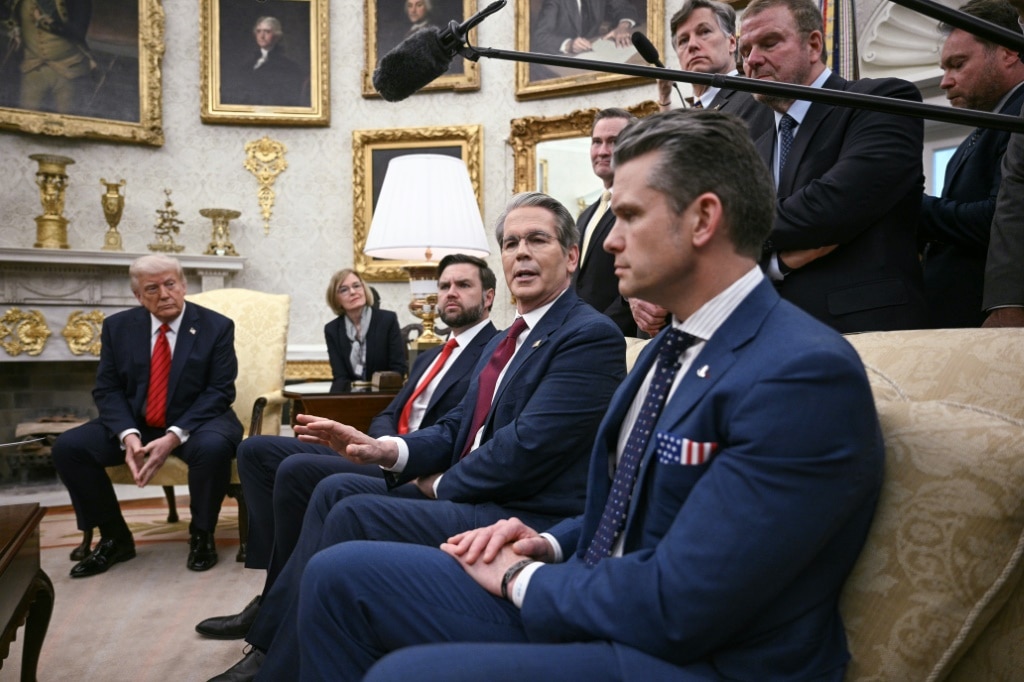Trump ousts national security adviser Mike Waltz
Marco Rubio takes on added role of interim national security adviser while Mike Waltz is made US envoy to the UN after losing favour with the president after the Signalgate fiasco.

President Trump is replacing national security adviser Mike Waltz roughly a month after he put a journalist on a group text chat in which advisers discussed a sensitive military operation, making him the first top official to lose his job in Trump’s second term.
Trump announced on social media on Thursday that Waltz would be nominated as US ambassador to the United Nations. Secretary of State Marco Rubio will step in as interim national security adviser, Trump said, and he will continue to also serve in his current role.
“From his time in uniform on the battlefield, in Congress and, as my National Security Advisor, Mike Waltz has worked hard to put our Nation’s Interests first. I know he will do the same in his new role,” Trump wrote on Truth Social.
Waltz responded on social media, saying he was “deeply honoured” to continue serving the President and attaching Trump’s Truth Social post.
I’m deeply honored to continue my service to President Trump and our great nation. pic.twitter.com/FFTPjnIYkI
— Mike Waltz (@MikeWaltz47) May 1, 2025
Waltz lost favour with the president and his senior advisers after The Atlantic revealed that he added a journalist to a chat on the non-government messaging app Signal, a crisis that dominated headlines and became one of the first major embarrassments for the administration. Trump declined to fire Waltz immediately, but privately expressed his frustration with Waltz.
Trump and senior administration officials, including White House chief of staff Susie Wiles, had been frustrated with Waltz even before the Signal debacle. Waltz hired aides that his critics said didn’t appeal to Trump’s MAGA base and struggled to relay the president’s national security priorities on television — once seen as the former Florida congressman’s strength, according to administration officials.

He also was sometimes ideologically out of step with Trump, pushing more traditionally hawkish views on Ukraine and Iran, and clashed with other White House officials, people close to Trump said.
Waltz’s deputy, Alex Wong, is also being ousted, the people said. The former aide to Senator Tom Cotton (Republican, Arkansas) and senior negotiator during Trump’s first-term nuclear diplomacy with North Korea was seen by the president’s allies as a Waltz loyalist. Wong had been attacked by outside Trump allies, who asserted without evidence that he was pro-China. Other National Security Council staffers Waltz hired are also likely to lose their jobs, the people said.
Waltz was planning to travel to Michigan on Tuesday for the president’s rally marking his first 100 days in office. But Trump told him not to attend, according to administration officials.
Senior US officials said Waltz had been marginalised during debates on key decisions, namely starting talks with Iran over its nuclear work and brokering a peace deal between Russia and Ukraine. Steve Witkoff, Trump’s envoy to both of those negotiations, and Secretary of State Marco Rubio proved more influential in those deliberations, the officials said, noting that Rubio had recently been spending much of his time at the White House.
Waltz, the former Green Beret who was one of Trump’s strongest backers while in Congress and during the 2024 campaign, lasted just 102 days as national security adviser. He stayed in his role nearly five-times longer than retired US Army Lt. Gen. Mike Flynn, who was first to serve as national security adviser during Trump’s first term. Trump fired Flynn for lying to the FBI about contacts with senior Russian officials during the 2016 election cycle, but both men reconciled and Trump has spoken publicly about bringing the retired three-star general back into his inner circle.
Trump cycled through four total national security advisers during his first term. Whoever succeeds Waltz will be Trump’s sixth person in that position over two presidencies.
Waltz already survived one round of cuts to the National Security Council. Far-right conspiracy theorist Laura Loomer in April convinced Trump that Waltz had hired aides harmful to his agenda, leading to the ouster of at least four staffers. Waltz kept his job, though the episode was indicative of how he had lost influence with the president and control over his own team.
Waltz cut a diminished figure after the revelation he inadvertently placed The Atlantic’s Jeffrey Goldberg into the Signal chat where senior officials like Vice President JD Vance and Defence Secretary Pete Hegseth debated coming strikes on the Houthis. Waltz also referenced intelligence provided to the US by Israel in the discussion on the encrypted-but-unclassified system.

The report sent shock waves through Washington and immediately sparked questions about Waltz’s future as national security adviser. Trump stood by Waltz, calling the Signal story overblown by the media as aides said the president had complete confidence in him.
Soon after news of the Signal chat broke last month, Trump let Waltz know in a one-on-one meeting that the national security adviser would keep his job.
But Trump continued to ask personal allies in the White House and Mar-a-Lago, his private Florida club, what they thought of Waltz, a sign that the president was considering alternatives.
Hegseth has come under fire for using his personal phone to relay information about the Houthi operation on a second Signal chat that included his wife. Some current and former Defense officials have accused him of running a dysfunctional front office at the Pentagon.
Trump, as he did initially with Waltz, has insisted he stands by his defence chief.
Wall Street Journal





To join the conversation, please log in. Don't have an account? Register
Join the conversation, you are commenting as Logout